
When India launched its brochure outlining the country’s priorities as non-permanent member at the UNSC for the period 2021-2022, the inclusion of the iconic image of India’s first all-female police unit deployed in the UN peacekeeping mission in Liberia together with Liberia’s former president Ellen Johnson-Sirleaf, was unavoidable. The all-female police unit is one of India’s flagship initiatives to underline its role as an advocate for the UN’s Women Peace and Security Agenda (WPS). The WPS agenda has placed women’s meaningful participation as central to all stages of the peace process and encouraged greater participation of women in peacekeeping.
Apart from the deployment of the first all-female police unit from 2007-2015, India has since 2019 deployed a Female Engagement Team as part of a Rapidly Deployable Battalion in the UN Mission MONUSCO (Democratic Republic of Congo), and has pledged to contribute additional all-female police units to UN peace operations. Moreover, the country has been active in training future peacekeepers on gender-sensitive topics and together with UN Women India has developed a female military officer’s course.
The WPS agenda has placed women’s meaningful participation as central to all stages of the peace process and encouraged greater participation of women in peacekeeping.
India’s efforts have been lauded by the international community, which — two decades after the launch of the WPS agenda — continues to struggle with its implementation. For instance, the numbers of female personnel in UN missions have evolved very gingerly: The number of uniformed women increased from 1 percent in 1993 to 4.8 percent of military contingents and 10.9 percent of formed police units in 2020. Increasingly, there has been an acknowledgement in UN circles that member states cannot contribute more female peacekeepers, as they are absent from the domestic security sectors. Moreover, problems with implementing the WPS agenda are perpetuated by gender inequalities within member states’ domestic security sectors.
India is no exception to the above-stated problems. While the country has undoubtedly made innovative contributions to the implementation of the WPS agenda, and its all-female police unit and the female engagement team have positively impacted the lives of many in their deployments, women continue to be underrepresented in the security sector and face barriers in terms of reaching gender equity with their male counterparts. For instance, of the country’s 1.4 million active personnel in the Armed Forces in 2019, less than 4 percent women served in the army, 6 percent in the navy and 13 percent in the air force. As the largest armed police force, the Central Reserve Police Force (CRPF) employs almost 300,000 police officers, of which a mere 2.65 percent are women. For the civilian police, a recent report based on government data found that 7.28 perecent of India’s police forces are women. The government’s efforts to encourage higher numbers of women in the security forces have so far been unsuccessful.
Increasingly, there has been an acknowledgement in UN circles that member states cannot contribute more female peacekeepers, as they are absent from the domestic security sectors.
Regarding gender inequality in the security sector — some strides have been made — but there is much room for improvement. In the Armed Forces, until very recently, women have only been allowed to serve as officers until a maximum of 14 years. It is only following the 2020 Supreme Court ruling that women officers in the army and navy can opt for Permanent Commission, i.e., employment until retirement, with full benefits. While this Supreme Court ruling has removed some barriers in the way of gender equality, government statements during the ruling have revealed that gender stereotypes are rigid. The government had, for instance, hold that women are the ‘weaker sex’ and are not suitable for taking up combat or command functions. Moreover, it argued that the primary care for children is the responsibility of women, making them unfit to commit to the army’s ‘way of life, which requires sacrifices and commitment beyond the call of duty of the entire family.’
In terms of the Indian police forces, progress towards gender equality is more advanced. Women can perform both as regular constables as well as in command roles. For instance, the CRPF has been forthcoming regarding separate housing and sanitation facilities, including family care and reconciliation. Moreover, since 2002, there is a National Conference for Women in Police, which provides a platform for policewomen to advocate for greater gender equality. Nevertheless, a 2019 report on the status of policing in India has found that male police officers continue to be biased against their female-co-workers, doubting their physical strength and their capability of handling higher intensity crimes, and over half of the participants felt that there is no parity between men and women. The report also stated that women are more often engaged in in-house tasks, such as computer operation, while male personnel are sent on field duty. Consequently, women cannot prove the operational skills necessary for career advancement and a greater acceptance within the police. Furthermore, government reports show that promoting ‘gender sensitivity’ within the police forces and beyond is believed to be women’s responsibility. Consequently, gender-sensitivity training is more likely to be offered to women than men.
In terms of the Indian police forces, progress towards gender equality is more advanced. Women can perform both as regular constables as well as in command roles.
In the country’s opening speech, upon assuming its non-permanent seat in the UN Security Council on 1 January 2021, India has highlighted that peacekeeping and peacebuilding will receive India’s attention on the Council and that the inclusion of women will play an important role. Thus, it is likely that the Indian government will also address the implementation of the WPS agenda during its term. India has the potential to emerge as a champion of the WPS agenda. However, for this to happen, it needs to recognise that achieving greater gender parity in international peacekeeping deployments is directly linked to the level of gender equality in the domestic security sector and vice versa. For instance, as women are underrepresented within the Armed Forces, in June 2020, women made up less than 1 per cent of the country’s overall troop contributions to UN peacekeeping. Moreover, leaving the responsibility of achieving greater gender parity with women alone – given their marginalisation in the security sector – will not be enough to unlock an actual change towards gender equality.
Overall, India’s leadership role on WPS cannot be borne by the tremendous work of India’s all-female units alone, but needs more commitment from the government to make the domestic security sector an enabling environment for both women and men.
The views expressed above belong to the author(s). ORF research and analyses now available on Telegram! Click here to access our curated content — blogs, longforms and interviews.




 PREV
PREV


